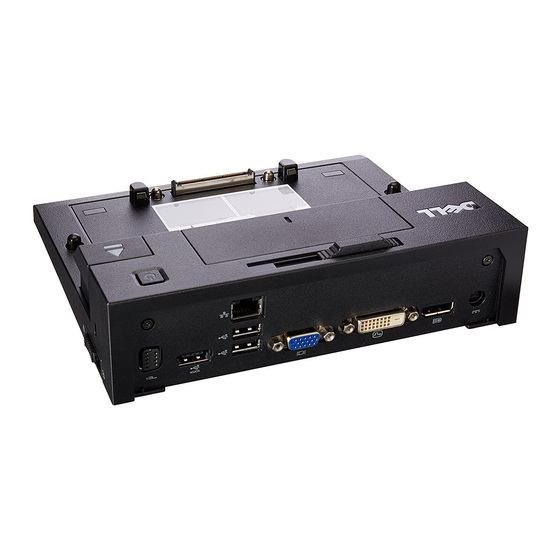
Summary of Contents for Dell E-Port PRO3X
- Page 1 Dell™ E-Port User’s Guide Model PRO3X w w w . d e l l . c o m | s u p p o r t . d e l l . c o m...
- Page 2 Other trademarks and trade names may be used in this document to refer to either the entities claiming the marks and names or their products. Dell Inc. disclaims any proprietary interest in trademarks and trade names other than its own.
-
Page 3: Table Of Contents
Contents About Your Dell™ E-Port Using the Dell™ E-Port Setting Up Your E-Port Before You Dock for the First Time Docking Your Laptop Securing the E-Port E-Port Laptop Power and Docking Status Using the E-Port with Dual Monitors Undocking Your Laptop... - Page 4 Contents...
-
Page 5: Icons Description
About Your Dell™ E-Port The Dell™ E-Port supports the Dell E-Family laptop computers, but it is not compatible with any previous series laptop computers. The E-Port enables you to connect your laptop computer to the following external devices: Connector Description... - Page 6 O R E C O N N E C T O R S ATA supports USB or Dell-powered E-Family or standard self- powered eSATA devices. — Connects to the O N I T O R S T A N D C O N N E C T O R monitor stand;...
-
Page 7: Product View
USB connectors (3) DisplayPort connector VGA connector USB or eSATA connector audio connectors (2) AC adapter connector DVI connector USB connectors (2) E-Monitor stand connector About Your Dell™ E-Port... -
Page 8: Product Rear View
About Your Dell™ E-Port alignment mark eject button security cable slot docking connector... -
Page 9: Using The Dell™ E-Port
Using the Dell™ E-Port CAUTION: Before you begin any of the procedures in this section, follow the safety instructions that shipped with your computer. Setting Up Your E-Port NOTE: If the cable connector of the external device has thumbscrews, tighten the screws to ensure a proper connection. -
Page 10: Docking Your Laptop
You can use the AC adapter to power the E-Port and the laptop, which charges the battery.‘ NOTICE: Always use the Dell AC adapter that came with the E-Port. If you use any other commercially available AC adapter, you may damage the E-Port or the laptop. AC adapter cable 1 Complete the steps in "Before You Dock for the First Time"... - Page 11 Slide the battery bar adjuster to the left to retract the battery bar. 4 If your laptop does not have a battery extending from the back of the laptop, extend the battery bar by sliding the battery bar adjuster to the right. Using the Dell™ E-Port...
- Page 12 7 If the laptop was not already turned on, turn it on by pressing the power button on either the laptop or the E-Port. 8 If the laptop does not turn on or awaken successfully, undock and reseat the laptop. Using the Dell™ E-Port...
-
Page 13: Securing The E-Port
Securing the E-Port Antitheft devices usually include a segment of metal-stranded cable with an attached locking device and associated key (available at Dell.com). For instructions on installing this kind of antitheft device, see the documentation that came with the device. -
Page 14: E-Port Laptop Power And Docking Status
AC adapter connected Unit docked and AC adapter connected Unit docked using AC or battery power Unit docked using AC or battery power Using the Dell™ E-Port Power Button Light Hibernate or Off Hibernate or Off Standby Breathing Docking Light... -
Page 15: Using The E-Port With Dual Monitors
The E-Port supports three video ouptut formats—VGA, DVI, and DisplayPort. You can use your E-Port for dual monitor display. Refer to the table below for using the E-Port with dual monitors. Monitor 1 connection DisplayPort DisplayPort DVI connector Monitor 2 connection DisplayPort DisplayPort Using the Dell™ E-Port... -
Page 16: Undocking Your Laptop
2 Press the eject button to undock the laptop from the E-Port, then lift the laptop away from the E-Port. NOTICE: Do not pick up the laptop or the E-Port when the laptop is docked. Doing so can damage the connectors on the laptop and on the E-Port. Using the Dell™ E-Port lock/unlock switch... -
Page 17: Specifications
USB connectors: five 4-pin, USB 2.0-compliant connectors; one USB or eSATA connector headphones/speakers and microphone one RJ-45 port; 10/100/1000 GB Ethernet one custom connector (Dell E-Family only) VGA, DVI, DisplayPort (HDMI via dongle) one connector supporting USB or Dell-powered E-Family or standard... - Page 18 System Level Operational Specifications Variable Temperature (system external) Temperature ramp rate Humidity (non-condensing) Humidity ramp rate Altitude System Level Non-Operational and Shipping Specifications Variable Temperature Temperature ramp rate Humidity (non-condensing) Humidity ramp rate Altitude Specifications Minimum Typical 0°C 25°C 0°C/hr 0 m (0 ft) Minimum –40°C...
-
Page 19: Finding Information
Documentation This type of information may have shipped with your computer. For additional regulatory information, see the Regulatory Compliance Homepage on www.dell.com at the following location: www.dell.com/regulatory_compliance. Contents • Warranty information • Terms and Conditions (U.S. only) • Safety instructions •... - Page 20 Finding Information...
-
Page 21: Glossary
Glossary Terms in this Glossary are provided for informational purposes only and may or may not describe features included with your particular computer. AC — alternating current — The form of electricity that powers your computer when you plug the AC adapter power cable in to an electrical outlet. DisplayPort —... - Page 22 parallel connector — An I/O port often used to connect a parallel printer to your computer. Also referred to as an LPT port. PS/2 — personal system/2 — A type of connector for attaching a PS/2-compatible keyboard, mouse, or keypad. SATA —...










